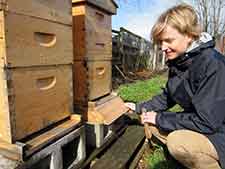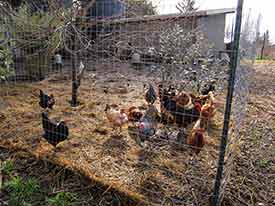Lisa H. Weasel is a molecular biologist, an associate professor of biology at Portland State University, and the author of Food Fray: Inside the Controversy over Genetically Modified Food. This 5-part interview was conducted in February of 2010, and predates last month’s decision by the USDA to deregulate the production of roundup ready alfalfa; the recent lifting of the restriction on GM sugar beets; and now, the approval of an industrial GM corn for bioethanol production.
See Also:
- Interview with Lisa Weasel: Food Fray: Inside the Controversy over Genetically Modified Food
- Interview with Lisa Weasel:-2
- Interview with Lisa Weasel: Food Fray:-3
- Interview with Lisa Weasel: Food Fray:-4
- Interview with Lisa Weasel: Food Fray:-5
Part 5; Do you think that GM food can help solve issues of hunger and food security worldwide?
I think it’s really overly simplistic to suggest that individual genes can solve food security issues and hunger because there are so many complex factors that play a role in terms of people’s access to food. Economics is a huge factor as is geography.
When I was in Zambia I learned that a lot of the food aid issues there are really just transportation issues. The country has enough food but they can’t get it to the people who need it. Issues in India are economic in many cases. The country has enough food but people can’t afford to buy it even if it’s heavily subsidized. There are so many factors. Even at the biological and agricultural level, people who are really suffering from food insecurity have not had access to the same kind of inputs. It’s an issue of providing enough inputs.
Irrigation is a big one. So is soil fertility however you accomplish that — through heavy chemical input or organic approaches. Poor soil fertility, lack of irrigation, lack of even hybrid seeds that have what we consider modern traits that are not genetically modified. A genetically modified seed is never going to grow if you can’t water it, even if it has a gene that helps it tolerate drought stress. If there’s no irrigation and periods of really significant drought those seeds are never going to sprout and grow.
It’s very oversimplified to suggest that GM foods can solve these complicated issues. At the same time there may be isolated cases where disease resistance, genetic modification, transgenic technology may be able to assist there. I don’t think we should rule it out but at the same time there’s such a focus on this issue of genetic modification being the tool that’s going to solve world hunger. I think we really need to put it on the shelf for a while and look at the basics that are on the ground – look at what the real root causes of world hunger are. You can introduce as many new genes into plants as you want but if farmers don’t have access to get the basic inputs they need just to get any kind of plant to grow it’s not going to help at all.
The most popular biotech genetically modified argument at the moment seems to be that GM food is capable of solving the agricultural crisis brought on by climate change – what do you think of this argument?
I think that you need to start off addressing this question by looking at the huge contribution that agriculture, especially industrial agriculture, makes to climate change. Twenty percent of emissions are coming from agriculture so I think we really have to ask the question, “What kind of agriculture?” If we’re taking this industrial agriculture that’s having a huge detrimental impact on climate change issues and saying, “Oh now we’re going to put in genes that help to alleviate some of these problems,” well there are other much more effective approaches.
I think we really need to deconstruct agriculture as a whole and ask where those emissions are coming from and what kind of practices are leading to those emissions and ask whether single genes are really going to provide even the best Band-Aid.
I also don’t think we should just throw this kind of technology out the window and say we should never use it because there may be ways in a more integrated and sustainable model that some genetic modification can contribute.
It’s just like the hunger issue – the contribution that agriculture makes to climate change goes far beyond just the varieties of plants that are grown and the problem is so much greater than single genes can impact. It’s a much bigger question.
In your travels researching the GM food issue you spent a lot of time with industry officials but you’ve also spent time with farmers in developing countries. How has experiencing the controversy over genetically modified food, hunger and sustainability from the vantage point of people’s lives changed your perspective as a scientist?
I think it’s really humbling as a scientist to go and see people who are struggling on the ground with these issues. As a scientist we’re taught that we have all this knowledge, that we have the solutions, but then you go and see what the real challenges are and it’s humbling to see that what might be a great solution in a laboratory, or theoretically, or even for US agriculture is probably not going to help and could even harm farmers who are facing drought and soil fertility issues.
Also, recognizing how much knowledge some of these small farmers do have that’s genetic knowledge is very powerful – I write about this in my book. These women farmers in India – they don’t read or write but they know a lot about even the genetics of their seeds. They say, “Our seeds know our soil.” They select those seeds.
In a much more complex model of agriculture you think of American industrial agriculture as sort of the pinnacle of agricultural success but it’s a very simplistic model. Yes, it’s complex in terms of the inputs – accounting, GPS, all of those kinds of technologies, but from a biological level it’s oversimplified. Huge chemical intensive inputs pumping out monocultures.
Then there are these women farmers have to know a lot about different seeds and how they grow together, how they adapt to different climatic conditions. It’s also humbling to see that it’s not just scientists that have the knowledge that can be applied to help these farmers. It’s good to see that maybe the best way to promote food security is to change your own eating or consumption habits. It had a big impact in that regard.
Developing relationships with these mostly women farmers that I was working with and being able to share knowledge about my life and how I relate to food and that I grow my own food was also really important. I remember sitting around and they asked me if I had a cow and I said, “I don’t have a cow but I have chickens.” “Oh chickens, why don’t you have a cow?” I told them that the permitting in Portland wouldn’t allow us to have a cow and that I don’t really have the space to have a cow anyway.
That kind of approach where we’re just sharing information about our lives was another important aspect of doing that kind of research. It’s a way to find out more about the ways in which people live and not just the differences – vast differences – between myself and these women.
They have bags and baskets of seeds in their house where I have furniture. When you need to use the bathroom you go out in the stall with the cow in their front vestibule. It’s a very, very different life but finding out the commonalities and similarities is really comforting. We care about the same issues. The material bases of our lives – preparing food, taking care of ourselves, health issues, children – there are some similarities there. Bottom line, these farmers are able to talk about the genetically modified food issue from their vantage point with a lot of credibility.
Why is Europe seemingly so hostile toward GM foods in contrast to the US?
Surveys have shown that Europeans — mostly because of the mad cow epidemic — don’t trust the government as much. They’ve had these bad experiences but we’ve had some pretty significant food outbreaks here too — peanut butter and salmonella, and ecoli in hamburgers. So I think that it’s much deeper.
In my research it was interesting talking to scientists and anti-GM foods activisits, particularly Greenpeace in Europe. In Europe there’s a much deeper tension that we don’t have here in terms of the relationship to science and technology. The whole scientific revolution in Europe — people never really made the full conversion in letting go of the more organic worldview with transition into a mechanistic model. Culturally I think that tension around science is still much more alive in Europe than it is here where science equals progress. We don’t have that history based on our land and in our farms and culture.
It was interesting learning while interviewing some of the Swiss scientists that they have all kinds of rituals there — to burn the snowman for an early onset of spring, marching through the streets farmers and scientists together. Farmers and scientists participate together in these rituals and rites and we don’t have so much of that here. Our relationship to science and technology is a little bit different. It’s particularly relevant to the issue of genetically modified food where you’re crossing these species boundaries. Is that seen as unnatural or is that seen as progress? Americans don’t have that baggage.
The big issue is our relationship to food – knowing where our food is grown, how it’s grown, what kinds of foods we eat. We’re very happy to take all kinds of hybrid foods – trans fats. Food technology has made huge advances here and we seem to be very eager to eat that up.
One of the people that I interviewed in Europe said, “If Americans are willing to eat McDonald’s special sauce then of course they don’t care if it’s genetically modified.” If you look at the kinds of foods that we consume here a little genetic modification is minor in comparison to some of the bigger issues.
Since Food Fray’s publication what major changes have taken place worldwide in regard to GM food?
The advent of genetically modified sugar is a big new entrant into GM food. Sugar is heavily marketed to children in candies and cereals and things like that so initially some of the candy companies had concerns about accepting sugar from genetically modified sugar beets but they’ve largely pulled back.
The litigation on the sugar beets and the need to look at the environmental impact statement has been a big issue for organic farmers because of the seed contamination.
There’s been a lot of discussion and there was initially a lot of enthusiasm about biofuels and using genetic modification for biofuel crops but then the political fallout of using food crops for biofuel or even switch grass for biofuel, the applicability of that seems to have dampened that big argument.
Biopharmaceuticals — Oregon just finally last week got the rules. We spent a year as a biopharm task force in the state of Oregon coming up with policy recommendations for the regulation of food crops that have genes with pharmaceutical compounds expressed. I think that biopharmaceuticals have lowered their profile on the radar in the past year.
A year ago there was a lot of hype about the first biopharm products coming out. There are clinical trials going on in the UK with biopharm insulin — insulin produced in safflower – but there are some issues in the delivery of that drug and how effective delivery mechanisms can be developed. I think that a lot of the hopes for biopharmaceutical products have failed to reach the market.
As with any technology there’s a lot of hype as well as failures but I think the big issues are around increased attention to environmental impact statements with sugar beets and alfalfa. Now the BT eggplant case in India is really putting India on the map.
Are there other countries such as India that have recently undergone major changes in terms of their relationship to genetically modified food?
The European Union continues to struggle with member countries that do not want genetically modified crops grown since the WTO case saying that Europe has to accept genetically modified crops. Consumers don’t have to accept them but countries can’t reject growing them. The European Union has struggled with what to do with individual member nations that don’t want them and that’s a source of ongoing tension.
In Brazil genetically modified crops have really dramatically expanded since they’ve been accepted there. Proponents of biotech – the industry association would say, “More countries than ever are growing genetically modified crops and more and more acreage is consumed by them.”
How would you like to see genetically modified crops evolve?
I think that we need to expand our definition of agricultural biotechnology to use tools that are helpful and diagnostic as well as product driven tools. I think that more public funding and research into appropriate regulation of genetically modified food, into safety not just in regard to human health but also impacts on soil and microorganisms, into a lot of the more long term ecological studies is crucial.
These crops are out there and they’re obviously not going to disappear from the environment even if we want them to. The majority of soy and corn grown in this country are genetically modified varieties and I think that there’s a huge gap in our understanding of what the bigger term ecological impacts are that may not seem important, that may not seem to be causing us to keel over and die, may not be causing the disappearance of every plant on earth. Subtle shifts in ecosystems can have huge dramatic impacts.
There was a study that came out last year suggesting that the stover – the stems and leaves from the BT corn – when washed into streams could impact the populations of caddisfly larvae. And of course caddisfly are a very important food for freshwater fish. That could have huge impacts. That led to a huge polarized debate and this tends to drive researchers out of field as bad science, not well controlled etc. It’s a very important question to look at. In ecological studies answers do not come out of single experiments. They come out of longer term research, and by looking at many different variables.
I’d like to see much more publically funded research focused on these kinds of issues dealing with existing GM crops that are out there. That would push things in a different direction and balance out our view of what are appropriate biotechnologies — rather than just this focus on transgenes that can lead to patenting and good income.
Liz Crain writes about Pacific Northwest food and drink for various print and online publications. Her book Food Lover’s Guide to Portland was published by Sasquatch Books in July 2010. She is also a fiction writer and editor at Hawthorne Books.



